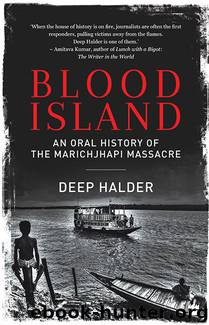Blood Island by Deep Halder

Author:Deep Halder [Halder, Deep]
Language: eng
Format: epub
Tags: null
ISBN: 9789353025885
Publisher: HarperCollins Publishers India
Published: 2019-05-24T22:00:00+00:00
4
Niranjan Haldar
N
iranjan Haldar’s apartment at Bose Pukur in Kolkata’s southern fringes reminds me of the CPI(M) party office in the northern end of the city. Books and documents are piled on the divan where Haldar manages to make a little space for himself, offering me one of the few colourless plastic chairs he’s surrounded by.
These are not books and documents you will find at the party office. Most of Haldar’s study material is critical of the Left Front rule in West Bengal and a few of them document arguably their worst misdeed – Marichjhapi.
Refusing to remain shut on Marichjhapi has stunted Haldar’s career. The veteran newsman has been a friend of the family and one of the most prolific writers on Marichjhapi. The communist government in West Bengal retaliated by arm-twisting the management of newspapers he worked with to put him on ‘desk jobs’. The bylines dried up, but Haldar never stopped digging into the whys and hows of Marichjhapi. This eighty-six-year-old is considered a living Wikipedia on Marichjhapi in Kolkata’s research circles.
Sidelined by a communist government’s ‘dirty tricks department’, Haldar, interestingly, was a communist once. ‘I came to India in 1949 from East Pakistan. I was running away from the police after they got a warrant out in my name for being involved in students’ movements. Communism lands you in all kinds of trouble. You should remember your college days,’ he laughs.
I am embarrassed at this unexpected reference to a chapter from the early days of my life wasted in futile sloganeering and little else, and offer Haldar a sheepish smile.
‘So, tell me, how far has your Marichjhapi research taken you?’
I tell Haldar of my travels to Madhya Pradesh’s belly and to Mana Camp in Raipur, Chhattisgarh. I tell him how I met Manoj Kharati, a BJP Yuva Morcha leader in Betul district’s Chopna village in Madhya Pradesh, which is one amongst the thirty-six villages where there are only Bengali refugees. These are men and women who were sent to Dandakaranya after they landed in West Bengal from East Pakistan. The camps are gone but these people have stayed on, their next generations dimly aware of Marichjhapi. Many have not even heard of the place.
But there are some, like Kharati’s father, fifty-eight-year-old Khitij Chandra Kharati, BJP worker, farmer and shopkeeper, who had made the journey to Marichjhapi but had returned before disaster struck.
‘Do they remember Marichjhapi?’ Haldar is curious.
I tell him they do. Khitij Chandra Kharati had broken down before me during the interview, recalling how mothers put dead babies in the river, babies who died due to disease, malnutrition or both. He was in the first lot that had reached Marichjhapi from the Dandakaranya camps, cut goran trees to make huts, stayed up nights to guard shelterless companions from wild beasts and taken boats to neighbouring islands to bring back essentials. But he had given up on fellowmen and the Marichjhapi dream in the end.
Today, he blames not just the CPM government, but also the refugee leaders for the tragedy.
Download
This site does not store any files on its server. We only index and link to content provided by other sites. Please contact the content providers to delete copyright contents if any and email us, we'll remove relevant links or contents immediately.
| Africa | Americas |
| Arctic & Antarctica | Asia |
| Australia & Oceania | Europe |
| Middle East | Russia |
| United States | World |
| Ancient Civilizations | Military |
| Historical Study & Educational Resources |
Underground: A Human History of the Worlds Beneath Our Feet by Will Hunt(12097)
Sapiens by Yuval Noah Harari(5370)
Navigation and Map Reading by K Andrew(5156)
The Sympathizer by Viet Thanh Nguyen(4390)
Barron's AP Biology by Goldberg M.S. Deborah T(4150)
5 Steps to a 5 AP U.S. History, 2010-2011 Edition (5 Steps to a 5 on the Advanced Placement Examinations Series) by Armstrong Stephen(3733)
Three Women by Lisa Taddeo(3433)
Water by Ian Miller(3185)
The Comedians: Drunks, Thieves, Scoundrels, and the History of American Comedy by Nesteroff Kliph(3079)
Drugs Unlimited by Mike Power(2594)
A Short History of Drunkenness by Forsyth Mark(2297)
DarkMarket by Misha Glenny(2212)
And the Band Played On by Randy Shilts(2209)
The House of Government by Slezkine Yuri(2206)
The Library Book by Susan Orlean(2069)
Revived (Cat Patrick) by Cat Patrick(1991)
The Woman Who Smashed Codes by Jason Fagone(1973)
The Absolutely True Diary of a Part-Time Indian by Sherman Alexie(1913)
Birth by Tina Cassidy(1903)
